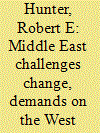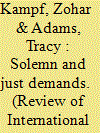| Srl | Item |
| 1 |
ID:
142890


|
|
|
|
|
| Summary/Abstract |
Nearly 30 years after I wrote “US Interests and the Use of Force in the Middle East”, these aphorisms are a good starting point for assessing American interests and policies in the Middle East, including approaches to the use of force. I take some quiet pride that what I wrote back then stands up well – for that era. And in terms of analysis of American interests in the region – mutatis mutandis – it also stands up well, as do the precepts for judging policy alternatives. As of today, criteria for US use of force are close to what I perceived them to be in 1986 – though following two major detours, Afghanistan in 2001 and Iraq in 2003.
|
|
|
|
|
|
|
|
|
|
|
|
|
|
|
|
| 2 |
ID:
175539


|
|
|
|
|
| Summary/Abstract |
Demands for apology are a prominent rhetorical means for pointing out transgressions in contemporary world politics. They transform ‘seen but unnoticed’ conduct into ‘seen and noticed’ transgression and attach a price tag to the restoration of damaged relations. Nevertheless, compared to the widely discussed practice of apologising, demands for apologies have received scant scholarly attention. In this article we adopt an actor-oriented perspective in order to situate the speech act of demanding an apology within the delicate management of interstate relations. In-depth content analysis of 57 cases of demands made by various state actors in a variety of diplomatic contexts between 1999 and 2019 let us delineate the discursive construction of transgressions, the normative scripts that inform acts of demands, the types of sought-after remedies, and their discursive consequences. We conclude by discussing the normative diplomatic scripts that guide demands for apology and how these speech acts reconfigure power relations in international politics.
|
|
|
|
|
|
|
|
|
|
|
|
|
|
|
|